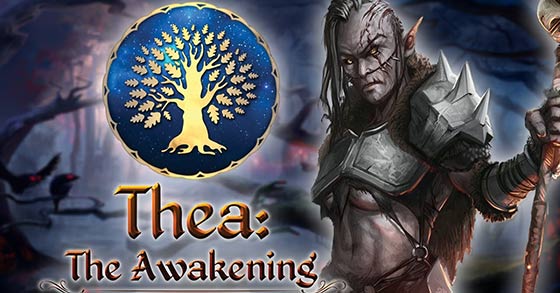Thea: The Awakening PC review – An alright concoction of gameplay elements

What do you get if you take the best bits from some of your favourite games and mash them together? The best game ever, right? That’s the theory, sure. Having been offered the chance to review Thea: The Awakening, it looked to have the turn-based elements of Civilization, the resource management of Settlers, RPG elements from Elder Scrolls with some rogue-like ingredients thrown in. Add on the current fashion, a trading card game, I felt I was in for a treat.
Thea is completely different to anything else I’ve played. Despite those elements I’ve mentioned, I found it very hard to compare it to any other game I’d played. The world has awakened from a long darkness. You are tasked with rebuilding that world. You start small and gradually set out across the world, exploring hexagon by hexagon, hunting valuable resources.

Thea: The Awakening is a turn-based strategic survival game. That’s based on Slavic myth and monstrosity.
What I thought was going to be a mixture of building my first settlement while expanding the map and finding new areas, settlements and other people, soon turned out to be a simple case of ensuring the survival of my group of adventurers. Every now and again, Thea’s system would throw up a distraction to kill off some of my characters or wipe out supplies back at my settlement, but it was the expedition group I had to concentrate on.
This is where the card games come in. While out exploring you will undoubtedly meet creatures and unsavoury characters. You have the choice of how to deal with these encounters depending on the make-up of your group. I liked the fact that I didn’t have to fight everyone I met. As I could use wits and words to overcome the odds. However, the encounters soon became rather tiresome as they were all decided by card battles. At first, like most trading card games I’ve played, I quite enjoyed it. Thea explains the mechanics pretty well, if a little wordy, and you can pick up the basics quite quickly. You feel like you’re having a hand in how the encounter turns out. Rather than relying on the luck of a dice roll, you select which card to play.

Lady luck plays a big role in the game. However, you can still turn things around even if you´ve been given a bad hand. Well, “if” you play your cards out in a smart way that is.
Yes, there are still large elements of luck, but even if you’re dealt a bad hand, there’s still a chance of turning it around by playing the “right” card. However, after numerous card battles, I was becoming tired of this mechanic and just wanted to skip it as quickly as possible. At this point, I would have happily reached for the dice, or, in this case, the auto-resolve button! I was a few hours in and hadn’t felt like I’d got very far as every encounter had to be decided by a mini-game. I quickly realised that there wasn’t as much strategy about the cards played as I first thought, it was more like a JRPG battle, choosing the right action for each character in my team at the right time.
Several hours into Thea I was becoming frustrated with the game. I was having to constantly fiddle with my traveling group, making sure they were well equipped, healed, fed while also managing the resources and buildings in my settlement along with the tech tree to further my people’s development. However, what was even more frustrating was the game’s need to screw me over! Several times I walked into encounters way above my level, without warning, severely damaging my group. Furthermore, the game threw up a random event almost wiping out my settlement. On a couple of occasions, the damage felt irreparable, and I ended up starting again.

You (the player) can dismantle or destroy unused items (dismantling returns some of the materials used to craft that item back to your supply).
At times, I felt Thea was unforgiving but on reflection it probably made me play the game “better”. Each time I failed, either a minor fail or catastrophic, I approached the next encounter (or restart) differently and tried different tactics. The rogue-like elements meant that no method was sure-fire but at least I was a little more battle-hardened. For some, this learning curve will appeal, and you will enjoy learning from your mistakes. For me, it happened a little too often and, in some cases, a little too randomly for my liking and enjoyment. I wanted to get further in the game, not start again.
As I mentioned at the start, this game takes elements from other games and blends them together. In a lot of cases, it does the job pretty well. However, as a whole, the game feels fiddly and average. The developers should have concentrated on one or two mechanics rather than trying to throw in as many popular ideas as they could.
Pros:
+ Good mixture of gameplay mechanics
+ Original
+ Plenty to do!
Cons:
– Challenging encounters
– Random events can wipe you out and need to restart
– Just needs to do the gameplay elements better
Gameplay: 3/5
Graphics: 4/5
Sound/music: 3/5
Controls: 4/5
Replay value: 3/5

Verdict: 3.5/5
Thea has some promising aspects and for some, the difficulty level and learning curve will prove an appealing challenge. The originality of the game is good. I like what the developers have tried. However, the randomness of some events coupled with the predictable card game mechanics stops this from being a great title. Thea 2: The Reawakening (if it happens) needs to focus on making each element a lot better than it currently is.
Title: Thea: The Awakening
Developer: Muha Games
Format: PC
Genre: Strategy/RPG/Survival
Resolution: 1080p
Release date: 2015-11-20
Difficulty: Hard
Spent time: 12 Hours
Average grade internationally: 73% Metacritic.com
PEGI age rating: 12
Price: £14.99
Install Size: 3GB
Simon Bunyard
The Gaming Ground
Twitter: @Lankysi
More by Guest Author:
- Farming Simulator 25 mods – downloading, installing & more
- Here are the top five most popular games of 2024 you need to play
- The role of music and soundtracks in creating immersive gaming worlds
- FS25 is coming this Fall (2024) with a large selection of mods
- How technology and social media have influenced the gambling industry
Tags: Indie games, MuHa Games, PC review, The Awakening, Thea, Thea The Awakening





















